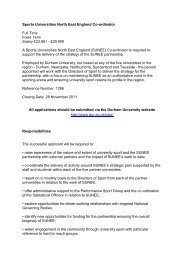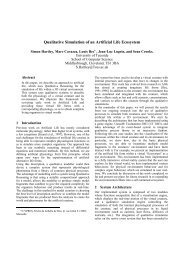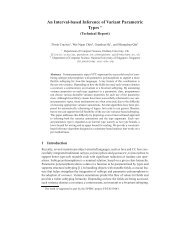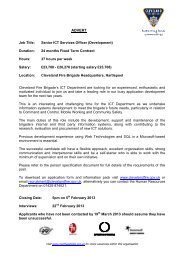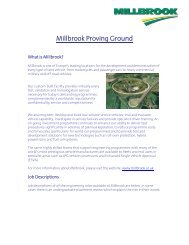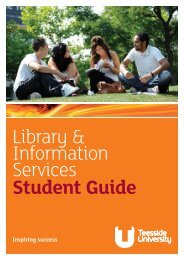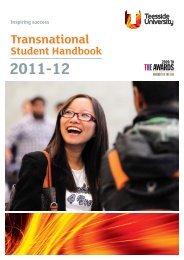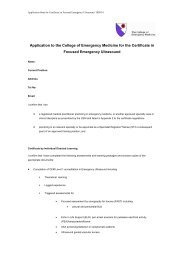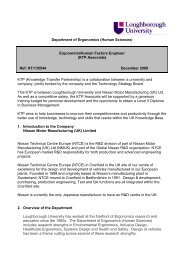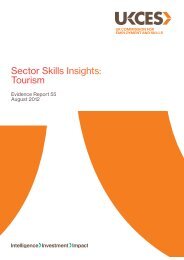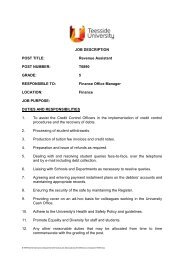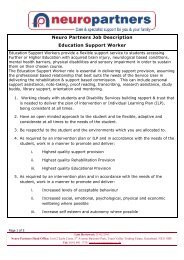International - University of Teesside
International - University of Teesside
International - University of Teesside
Create successful ePaper yourself
Turn your PDF publications into a flip-book with our unique Google optimized e-Paper software.
HEALTH CAREPreparing for the British climateThe British weather can seem cold and damp to manystudents, particularly those used to warm climates. It is bestto make sure that you have warm clothes and that youdress in layers, ie shirts and sweaters over T-shirts, with ajacket or overcoat on top. It is a good idea to have awaterpro<strong>of</strong> coat and a pair <strong>of</strong> strong shoes. You will alsoneed gloves, hats and scarves in the winter. It may becheaper to buy these things in the UK when you arrive.Looking after yourselfWhen you are in a new country, it is sometimes easy toconcentrate on your studies and forget to take care <strong>of</strong>your health. A different climate, unfamiliar food, expensiveclothing and heating costs can make it more difficult tokeep healthy.To keep warm, dress in layers, and don't be worried howyou look – British students may be more used to the coldand damp weather and wear less. If your clothes get wet,make sure that when you take them <strong>of</strong>f, you dry themthoroughly before wearing them again.If you come from a warm climate, you may have additionalproblems. British houses are not always well designed tokeep out the cold. Make sure that the rooms you live andwork in are warm enough and that you have plenty <strong>of</strong>warm blankets and bedding. Be careful not to overheat yourrooms as heating costs can be expensive, particularlyelectricity, and you'll feel even colder when you do have togo out.WHAT FOOD SHOULD I EAT?If you are cooking for yourself, eating the right food (andenough <strong>of</strong> it) is vital to staying healthy and warm. This isnot easy if the foods you normally eat at home can't bebought here. Try to ensure that you have a balanced diet <strong>of</strong>readily available food.Cheap protein foods can be used instead <strong>of</strong> the moreexpensive meat and fish, and these include beans, peas,lentils and nuts.Prices vary considerably, so shop around and look out forspecial <strong>of</strong>fers and cheaper cuts <strong>of</strong> meat. Buy the vegetablesthat are 'in season', ie locally grown and available withoutbeing imported, and be prepared to experiment – it canbe fun!Supermarkets will have everything you need, but can beexpensive. Street markets selling meat, fish, eggs, cheeseand vegetables can be much cheaper.If you do eat out, then the Refectory in the Students' Unionis a very good, cheap option. Some restaurants can beexpensive, although smaller cafes can <strong>of</strong>fer value for money.'Fast food' takeaway restaurants are plentiful, but are <strong>of</strong>tenrelatively expensive and the food less nutritious.COLDS AND FLUIn the winter, especially, a lot <strong>of</strong> infections such as colds andflu are passed around. You may be less immune to themthan the British students. Apart from eating well, keepingwarm and getting enough sleep, there is little you can do toavoid catching a cold. If you do, you may find that staying inbed for a day or so, and taking paracetamol and lots <strong>of</strong>liquids may be enough. If the symptoms get worse, or ifyou are worried, then you should make an appointmentto see the Student Health Adviser or your doctor.SEXBritish attitudes to sex may be different from those in yourown country. It is <strong>of</strong>ten accepted that people who areinvolved in a relationship may have sex together although, <strong>of</strong>course, the choice is a personal one. You are free to liveaccording to your own personal standards and shouldn'tfeel pressured to adopt those <strong>of</strong> your fellow students.Information on all matters <strong>of</strong> health can be obtained fromthe Well-Being Centre in the Brittan Building for Sport andRecreation or from the Students' Union Advice Centre.Food can be divided into four main groups and it'simportant to try to eat at least one item from eachgroup per day:• bread, rice, pasta or cereals• milk, cheese, yoghurt, butter or margarine• fresh fruit and vegetables• meat, fish or eggs28 INTERNATIONAL STUDENT HANDBOOK



